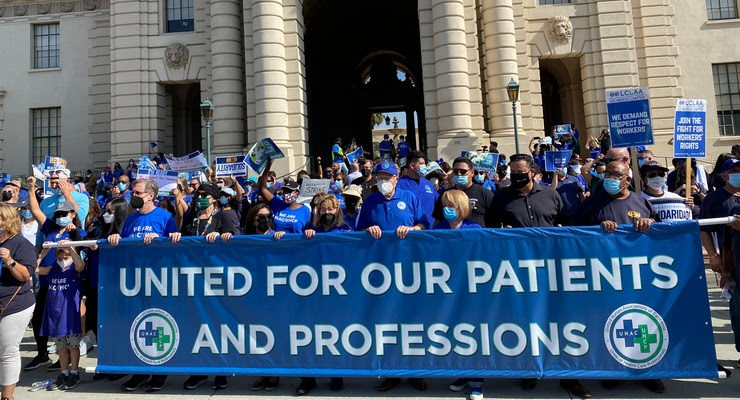
Kaiser Permanente’s regional headquarters are located in Pasadena.
Roughly 21,000 members of United Nurses Associations of California/Union of Health Care Professionals, including registered nurses, pharmacists, midwives, physical and occupational therapists, nurse practitioners, physician assistants and others, are scheduled to being an open- ended strike in Southern California. They’ll be joined in Southern California by about 7,400 members of United Steelworkers and by 3,400 members of Oregon Federation of Nurses and Healthcare Professionals.
Various other Kaiser employee unions have announced plans to hold sympathy strikes with the nurses over the course of the week, mainly on Thursday and Friday.
Union leaders say the walkout will impact 366 Kaiser facilities across Southern California, along with some quick-care clinics in Target stores and medical office buildings.
Arlene Peasnall, senior vice president of human resources at Kaiser Permanente, said business will go on at Kaiser, where facilities “will be staffed by our trained and experienced managers and the contingency staff we are bringing in as needed, and our physicians will continue to be available to care for patients.”
In an Friday email, Kaiser officials said they hope to reach agreement with the union prior to Nov. 15, but encouraged patients to avoid delays in refilling their prescriptions by planning ahead and using its free mail delivery services.
“In this interim period, we are encouraging members to plan ahead and pick up prescription refills they may need during the strike or order refills online or by phone to be delivered by mail at no extra charge,” the email said.
The major point of contention in the ongoing labor talks is over what the union calls the company’s proposed two-tiered wage system, an effort by Kaiser to balance wages in some markets where the health provider claims workers are being paid far above market rates. Peasnall said the wage disparities have arisen over the years as Kaiser negotiated wages on a national level, “so pay has not always been matched to the markets where we operate.
“As a result, over time in many areas our wage rates have grown to the point where our union-represented employees earn about 26% above the average market wage, and in some places it’s 38% above market,” Peasnall said in a statement. “These numbers don’t include the value of our industry-leading benefits and retirement and pension plans along with the opportunity to earn an additional 3% bonus every year, based on our performance.
“We are asking our labor partners to work with us to address this very real problem through an interest-based process, just as we have done with other challenges over the course of our partnership.”
She said the company’s latest offer would give current union employees raises of up to 4% a year, while maintaining other benefits.
But union officials said the company’s proposal is a way of depressing wages for new hires, creating inequities among members.
“For weeks, we’ve been beating back a two-tier wage package which would impact our ability to hire, recruit and retain during a severe shortage of nurses, health care workers and professionals — wage proposals that resemble those of a slash-and-burn corporation, not the leading health care provider that our members helped build,” UNAC/UHCP President Denise Duncan said in a statement. “For health care providers, a strike is always a last resort, but it’s clear from the employer’s latest proposals that this is the path they’ve chosen.
“Nurses and health care professionals have one priority: delivering the best possible care to our patients. Kaiser’s actions are destructive to that priority.”














 0 comments
0 comments


